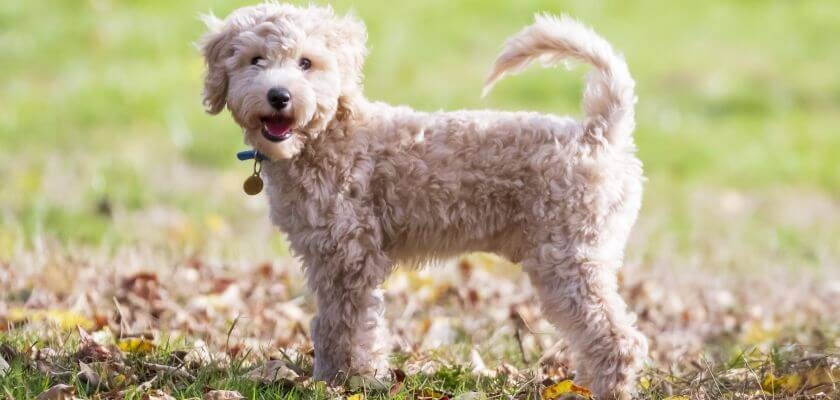The Poochon, otherwise known as Bichpoo or Bichon Poodle, is one of the most popular modern dog breeds. They are amazing living teddy bears which captivate not only with their appearance, but also with their temperament. You will not be bored with this dog. And most importantly, this pet will give you a lot of joy and love. As they are friendly and loving, they are the perfect family dog.
What Is a Poochon? Dog Breed Description
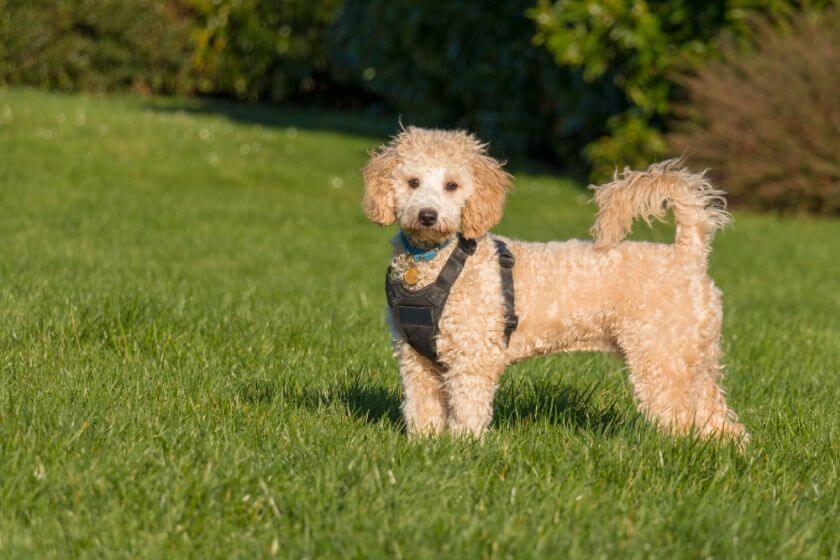
The Poochon is one of the poodle mix dogs. These are hybrid dogs bred by crossing a Poodle with any other purebred dog – in this case with the Bichon Frise. The purpose of creating this breed was to get rid of the health problems that owners have to face. Yet, these little dogs are also prone to some illnesses, as you will read later. Still, breeders managed to create a unique breed of dog which inherits the best traits from its parents.
It is a small dog – it doesn’t grow very big. Poochon adults can stand between 9 and 15 inches (22-38 cm) tall and weigh between 6 and 17 lbs (3-8 kg). Females are usually smaller than males.
Bichon Poodle – Appearance
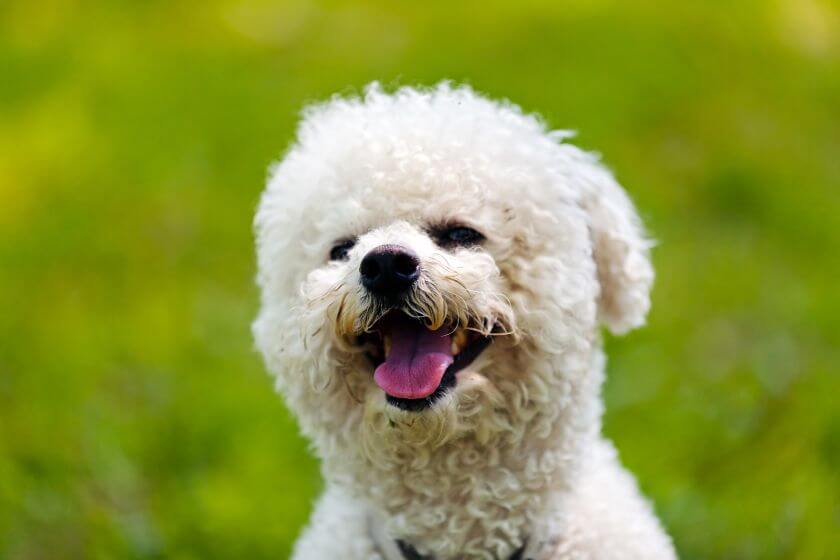
The appearance of this breed may vary, depending on which parent’s genes are stronger. So it’s hard to predict its exact physical and behavioral characteristics. This dog is known for its bear-like look. Short, stubby legs carry its small, light body. As was said before, the Bichon poo doesn’t grow to be very big. It looks up at its owner with dark, gentle, almond-shaped eyes, and an adorable, always smiling muzzle which will melt your heart. It has a black button nose and long floppy ears.
Color and Coat
Because this breed is a cross of the Bichon Frise and the Toy Poodle, Bichon Poodles can come in a variety of colors. They are usually brown, light shades of red, white, cream or apricot. The Poochon has a wooly curly coat of medium length. Most importantly, their coat rarely sheds. This makes the Poochon a hypoallergenic dog,making this breed perfect for those who suffer from allergies.
Poochon – Temperament
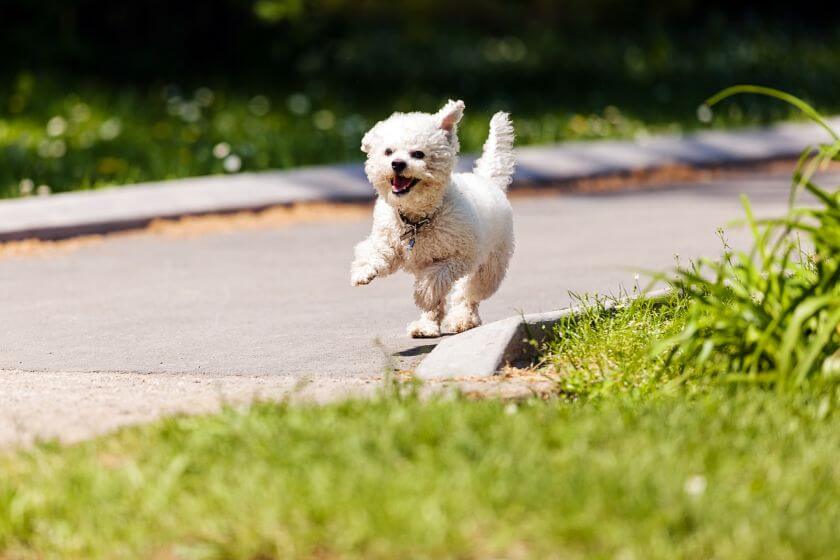
Since the Bichon Frise Poodle Mix is such an affectionate and friendly dog breed, it is an excellent family pet that can complement your home. They have plenty of love to give. So if you have children, feel free to invite these dogs into your home.
Poochons inherited their high intelligence from Poodles. For this reason, they are easy to train, so learning them new things is pretty straightforward. Just like their parents, the Bichopoo is a very active, energetic dog.
The Poochon is a friendly, playful and an extremely lovable breed – it can cuddle with you for hours. It loves to play and hates boredom, so it will be a great playmate for children as well as adults. Loyalty is yet another positive feature of these pets. It is impossible not to fall in love with the Poochon dog.
Approach to People and Other Animals
As the Bichon poodle mix has a very friendly nature, it easily bonds with its owner. It loves the company of people. It also enjoys the company of other animals. However, remember to socialize your dog from an early age. Go for walks, so that it can discover new things, get used to other animals and people. This breed doesn’t like isolation.
The Bad Personality Traits
Just as there are no perfect people, there are also no perfect dogs. Firstly, Poochons inherited a high-strung personality from the Poodle. These dogs become very nervous in unfamiliar situations.
Secondly, they may develop separation anxiety. So remember to socialize the dog from an early age, go out to strangers, spend time with them, and introduce them to other pets. Don’t leave them alone at home for long hours.
Thirdly, they can be mildly aggressive in the company of unfamiliar dogs. That’s why it’s so important for the Bichon Poo to meet other animals. Thanks to this, you will make their innate aggression less intense.
Poochon Dog – Health Issues
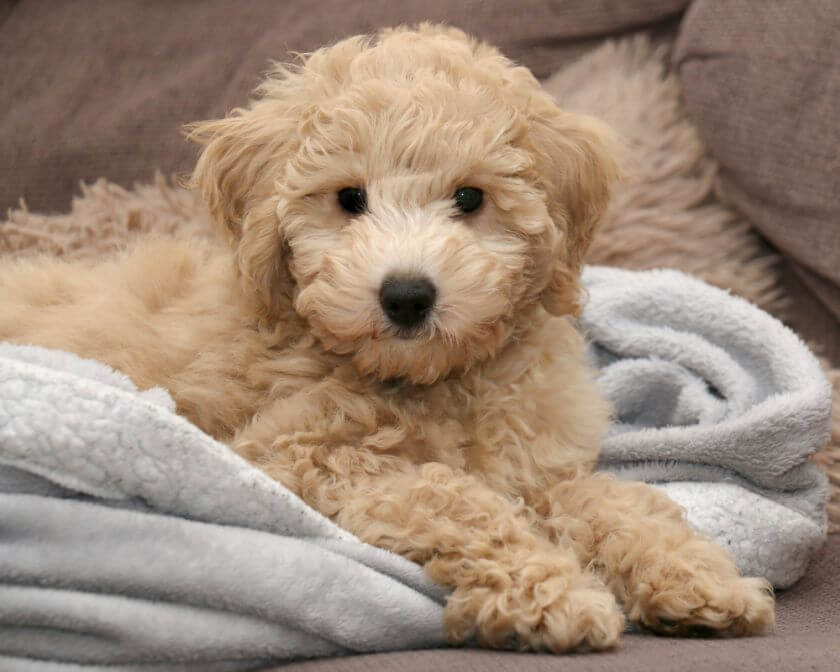
Lifespan
Both the Poodle and the Bichon Frise have similar lifespans. The healthy Poodle-bichon has a life expectancy of about 12-15 years.
Poochon Health Concerns
The Bichon Poo was intentionally bred to eliminate health problems associated with its parent breeds. However, these dogs are still prone to some health issues. The most common ones are as follows:
- Patellar Luxation – this is a common problem, especially amongst small dogs. An improperly aligned patella can cause lameness in the leg or abnormal gait,
- Progressive Retinal Atrophy (PRA) – this is a very serious eye condition which can cause blindness. Usually, the first symptom of progressive retinal atrophy is night blindness. Dogs are reluctant to go outside at dusk or during nighttime and cannot navigate properly in darkness,
- Addison’s disease – this is a disorder of the adrenal glands. This condition develops slowly. The first symptoms may not be noticeable even to the most concerned caregivers. The dog may be more lethargic, apathetic and less active. It may have a smaller appetite and, consequently, its body weight may decrease,
- ear infections – the Bichpoo is susceptible to ear infections, so remember to dry their ears when they get wet,
- dental diseases – if you want your Poochon to be in good health, visit your vet regularly and keep an eye on its overall wellbeing.
Poochon – Grooming & Dog Care
Grooming
Although the Bichpoo does not shed, it still requires grooming. Here are some tips on how to look after the Poochon:
- brush its coat regularly to prevent tangling and matting,
- bathe your pet once a month,
- brush your Poochon’s teeth once a week to prevent dental diseases,
- clean its ears once a week – Bichpoos are prone to ear infections,
- take your pet to a dog groomer once in a while, as the coat around its eyes should be trimmed regularly,
- the Bichopoo is prone to allergies, so your vet must regularly check your pooch’s skin,
- keep its ears dry and the eyes clean.
Bichon-Poo – Information About Food and Diet
As these dogs are quite active and have a lot of energy, they should receive regular meals throughout the day. It is best to give them food frequently but in small portions. They are prone to obesity if they are overfed, so you should not leave any food out.
As with the diets of other dogs, the Poodle-Bichon diet will also have to change with its age. The dietary needs will be different in puppyhood, adulthood, and senior years.
Bichon Poodle Training
Poochons inherited their intelligence from the Poodle, so they are quick learners and grasp new commands easily. They are also very energetic, active dogs which don’t like to get bored – they love challenges and mental stimulation.
How to train the Bichon Poo?
If you want an enjoyable training session, you need to be kind and gentle with your dog. Nobody likes getting yelled at, and this also extends to dogs. So, what should you do with your pet’s negative behavior? The best way is to ignore it. This dog dislikes strict training methods. You should also remember to use positive reinforcement. Reward-based training will work best. It should include verbal praise and treats.
You also need to remember not to treat Poochons like children, as they will then be stubborn and demanding. Training sessions should be short and commands should be varied. You shouldn’t repeat the same command multiple times. To keep your Poochon from becoming nervous and shy, you need to give them socialization training as well. Interact with other people as well as their pets, and don’t leave them home alone.
Exercise Requirements
This breed is of small size and it shouldn’t be overexercised. To keep it mentally and physically stimulated, 30 minutes of activity every day is enough. Take your dog for a walk once a day. A common feature of the Poochon is its tendency towards sudden bursts of energy. For example, you shouldn’t be concerned if your dog starts running around the house quickly.
As it is an extremely smart dog, it will be keen on playing games. For this reason, it’s worth giving your pet a toy, so that it can play with it or chew it to stay entertained. If the Bichpoo gets bored, it will bark or whine. Worst case scenario, your shoes will be used as a toy.
Poochon – Breeding
The Poochon is a designer breed, meaning that it is a mix between a purebred Bichon Frise and a Poodle. Be sure to find a reputable and trusted breeder who will not crossbreed parents with defects which may be passed onto offspring. Since it’s quite a small breed, small litters are usually born. The typical number of puppies in a litter is four or five.
Generations
- First-generation – a crossbred between a purebred Poodle and a purebred Bichon Frise,
- Second generation – a crossbred between two first generations or one first-generation hybrid and a purebred Poodle or Bichon Frise,
- Third generation – a crossbred between two second-generations. All crossings after the third generation are not considered hybrids.
It is best to buy a first-generation Bichon Poo, as they are healthier, stronger, and generally robust. In the later generations, dogs are less resistant to diseases and health problems are more noticeable. That’s why most breeders don’t sell third-generation Poochons.
Poochon – Price for a Puppy
As they are designer dogs, the average price for a Bichon Poodle pup is around $ 1000. Before purchasing not only a Poochon, but any other breed of dog, make sure you are buying from a respected and trusted breeder. They should provide you with all the necessary information on how to care for your pet.
Poochon – Breed Origin
The history of the Poochon is mostly unknown, as this breed is relatively modern. But if you want to know the history of this breed, you have to look at the origins of the Bichon Poodle parents. Let’s start with the Poodle.
The Poodles were a very popular dog in France and Germany. Their roots may be traced back to around the 15th and 16th centuries. They were considered as pets for the upper class. Since they are dogs which like to spend time in the water, they were used for water-fowl hunting. Later on, due to their beautiful looks, they became fancy companion pets. There are three types of poodles, – the standard, toy, and miniature.
The Bichon Frise comes from the Mediterranean. These little white dogs often accompanied sailors. They travelled on their boats, arriving at the Canary Islands and other far-off places. From there, Italian sailors brought them back to the continent in the 14th century. They quickly became the favorites of noble people.
Their popularity declined in the 1800s. However, after World War I, French and Belgian lovers of the breed decided to start their planned breeding. The FCI eventually recognized the breed as Franco-Belgian. In 1956, the first Bichons arrived in the United States.
It is believed that Poochons were first bred in Australia in the 1990s. In recent years, it has become a very popular dog not only in the US but also around the world. People love it for its affectionate and friendly disposition, its soft, non-shedding hair, and for the fact that it is a great companion for children to play with.
Poochon Puppies – The Right Owner Is…
The friendly and adorable personality makes Bichon poo an excellent family dog. They are perfect for:
- people who suffer from allergies,
- those who like exercising and going to parks,
- people who have enough time to look after their dog,
- those who can grant them the right amount of socializing. Without it, they may suffer from separation anxiety.
Poochon – Interesting Facts
- The Bichpoo has the sweetest smile.
- The Poochon has a very low-shedding coat.
- These animals love to cuddle.
- The Bichon Toy Poodle needs a lot of grooming to stay beautiful and healthy.
- For a non-pedigree dog type, the Poochon is quite expensive.
- It’s a hybrid, also called a designer dog.
- This dog breed adores being among people.
- It looks just like a teddy bear.
Summary
It’s a very affectionate, charming, and friendly breed. It captivates people with its sweet smile and soft, non-shedding coat. On the one hand, it loves to cuddle; on the other – it enjoys running, playing and performing tricks. It’s an intelligent, active, devoted, and loyal dog. It should be noted that this dog hates being alone, so it’s so important to socialize your Bichpoo from a young age and keep it company.
Frequently Asked Questions
Do Poochon Dogs Bark a Lot?
No, they are not known for excessive barking. However, as with any dog breed, proper training and socialization can help keep their barking to a minimum.
Do Poochon Dogs Shed?
No, the Bichon Poodle’s coat is low shedding and hypoallergenic. However, regular grooming is still necessary to keep their hair from matting and tangling.
How Big Is a Full Grown Poochon?
The size of a fully grown Poochon can range from 9 to 14 inches and weigh between 6 to 17 pounds. It’s important to note that the size can vary depending on the proportion of Poodle and Bichon Frise in their genetics. It’s best to consult a breeder to determine the expected size of your puppy.
How Much Do Poochons Cost?
The cost of a Poochon can vary depending on their pedigree, breeder location, and other factors. Generally, they tend to be more expensive than a purebred dog due to their high demand as a designer breed. On average, the price for a Poochon ranges from $800 to $1200.
Do Poochon Dogs Smell?
No, Poochons do not have a strong or unpleasant odor. However, they still require regular grooming and bathing to keep their coat clean and healthy. They may have a slight doggy smell after playing outside or being active, but it is nothing compared to other breeds.
How Long Can a Poochon Be Left Alone?
It is not recommended to leave a Poochon alone for long periods of time as they are known to suffer from separation anxiety. It is best to provide them with companionship and attention, or consider doggy daycare or a dog sitter if you need to be away for extended periods. A good rule of thumb is to not leave them alone for more than 4 to 6 hours at a time.
Are Poochons Easy to Potty Train?
Overall, Poochons are intelligent and highly trainable. With consistency and patience, they can be easily potty trained. It is important to establish a routine and positive reinforcement to encourage good bathroom habits.
How Often Should Poochon Be Groomed?
Due to their fluffy coats, Poochons should be groomed at least every 6 to 8 weeks. This includes trimming, brushing, and bathing to prevent matting and tangling of their fur. Additional grooming may be needed during shedding seasons or if they are regularly active outdoors.
Similar Posts:
- Daisy Dog – The Apartment Pet That Loves Everybody
- A List of Poodle Breeds: Types of Poodles and Doodle Mixes
- Meet the Maltichon Breed: The Maltese and Bichon Frise Mix
- The Havachon Dog Breed, a Bichon Frise and Havanese Mix: Grooming Tips, Temperament and Other Breed Information
- Small Dog Breeds – Finding the Perfect Companion Among the Smallest Dogs
- Dog Breeds That Don’t Shed: Hypoallergenic Dogs for You and Your Family
- A Dalmadoodle is a Dalmatian Poodle Mix and if You Haven’t Heard of Such a Dog Breed, It’s Time to Discover Dalmadoodles
- Everything You Need to Know About The Shichon Dog Breed: A Mix Breed Between Shi Tzu and Bichon Frise

